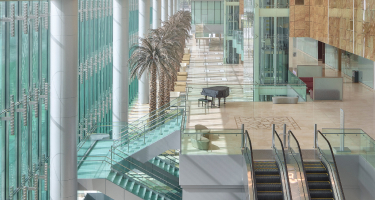Our Doctors
Meet all our doctors at Cleveland Clinic Abu Dhabi.
View Doctors

Myopia is a common refractive disorder and is typically related to an abnormally long eye. Light focuses in front of the retina instead of on it. This leads to blurry distance and intermediate vision. Myopia in children can be very easily diagnosed with a simple eye exam or vision screening.
Once pediatric myopia has been diagnosed, it can be compensated for with prescription glasses. In addition, lifestyle modifications are important to reduce the risk of progression, such as decreasing screen time as much as possible. If myopia continues to progress, we treat it with evidence-based approaches. This may include a pharmacological option or therapeutic contact lenses, or in some cases, a combination of both.
Treating myopia progression needs commitment on the part of the parents and their children, but the outcome is very rewarding. Book an appointment with one of our pediatric myopia experts now.
Our Pediatric Myopia Clinic brings together a multidisciplinary team of healthcare experts including: